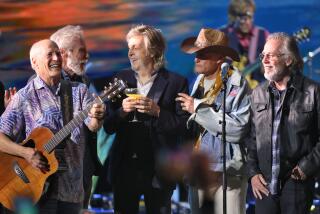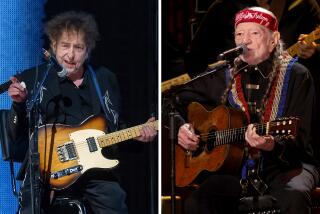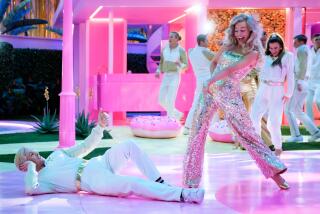Review: Herbie Hancock and Kamasi Washington cross the generational divide at the Hollywood Bowl
“Tonight feels like a big celebration,” a genial and relaxed Herbie Hancock said before introducing his new band on the Hollywood Bowl stage Wednesday night.
His group, which has spent the summer touring the country, superficially reflected Hancock’s predilection for assembling all-star bands during the season programmed by the Los Angeles Philharmonic, where Hancock has served as creative chair for jazz since 2009. While those meetings have been uneven — a few fitfully compatible pairings with Carlos Santana come to mind — this project, which features a few longtime collaborators and a notable wildcard in L.A. saxophonist-producer Terrace Martin, promised something different.
That in and of itself was cause for festivities, particularly given that Martin has been in the studio with Hancock for a long-gestating new album, which is said to also feature more rising stars of L.A.’s booming, beat-driven jazz scene in Flying Lotus, Thundercat and Jamire Williams.
Which brings us to the other celebratory aspect of the evening in its opener, Kamasi Washington. The biggest story in jazz since his 2015 triple-album “The Epic” burst him out of local venues like the Piano Bar and the World Stage and onto the wide-open festival platforms of Coachella and Bonnaroo, Washington and his band the West Coast Get Down were in a position to enjoy a much-deserved victory lap on a night that brought together two generations of jazz at L.A.’s most storied venue.
The significance wasn’t lost on Washington, who began by remembering his first appearance at the Bowl with South L.A.’s Multi School Jazz Band in 1997, which he cited as the moment he decided to become a professional musician. That kind of history practically demanded Washington begin his set with “Change of the Guard,” the tone-setting opener of “The Epic.”
Whether by design or collective adrenaline, the driving track accelerated with a nearly double-time pace around triumphant brass, rollicking keyboard and a swirling, science fiction sweep shared by the band’s backing orchestra and choir. Most of the group, which Wednesday also included Washington’s jazz musician father, Rickey, on soprano saxophone, have known each other since childhood, and some are now putting their stamp on the jazz scene with their albums.
Washington then led his band through “Giant Feelings,” written by keyboardist Brandon Coleman. Opening with a hard-hitting rhythm from two drummers in Tony Austin and Ronald Bruner Jr. and framed by swirls of G-Funk textures from DJ Battlecat, the song featured Coleman on vocoder and — in a clear homage to Hancock — a keytar.
Positioned nearby, fellow keyboardist Cameron Graves showed why his album “Planetary Prince” was one of this year’s standouts with a fiery, far-reaching venture during “Magnificent 7.” As he settled back to earth, Washington stood over his piano with his arms raised as the song gave way to a nimble, Hendrix-ian solo from upright bassist Miles Mosley, whose “Uprising” has been another highlight of the year.
Washington also offered the L.A. debut for the spiritually charged “Truth,” a simmering piece from his upcoming EP “The Harmony of Difference,” which he introduced as a celebration of diversity. Throughout his set, each musician joyfully pushed each other along, crafting an infectious atmosphere that helped propel the band outside the usual jazz circuit and, indeed, the usual crowd for a jazz night at Bowl, which appeared near capacity with a diverse mix of young and old.
Of course, Hancock was a big part of that draw too, and he sounded energized by his new band, which reflected a timeless yet forward-looking sense of adventure.
Opening with an elastic piece that flirted with the dark, simmering funk of his former bandleader Miles Davis’ “In a Silent Way,” Hancock zigzagged around the restless drive of drummer Vinnie Colaiuta with bassist James Genus and a steady wah-pedal from guitarist Lionel Loueke.
At the side of the stage, Martin shifted between keyboard, saxophone and a growling vocoder melody that underpinned Loueke’s maneuvers. As the piece ebbed and flowed, the group brushed past a few measures of Hancock’s 1965 classic “Maiden Voyage,” only to venture elsewhere.
And if there is an instrumental MVP of the current crop of jazz artists drawing from elements of R&B and funk, it’s the vocoder. “Come Running to Me,” a track from Hancock’s 1978 album “Sunlight,” sounded entirely of today as the pianist traded purring vocal harmonies with Martin. A newer piece, “Secret Sauce,” began with an atmospheric venture by Martin that spiraled through a near-operatic mix of moans and sighs, and led Hancock to his keytar for a duel with Loueke, whose effects and acrobatic fretboard work led his sound to often more resemble a keyboard than a guitar.
The night closed with similar recasts of Hancock staples “Canteloupe Island” and the strolling, thick-bottomed funk of “Chameleon,” a hit from “Head Hunters” that helped give birth to fusion more than 40 years ago with echoes that can still be heard now.
The only note missing in Hancock’s arsenal was a guest spot from Washington, a seemingly natural choice that could have built a bridge between two generations. A missed opportunity for a special moment, maybe — but if you were listening, the bridge was there all along.
See the most-read stories in Entertainment this hour »
Follow me over here @chrisbarton.
ALSO:
Transcending genre labels, Vijay Iyer leads the Ojai Music Festival toward bold new territory
Interview: Vijay Iyer on the Ojai Music Festival
Overrated/Underrated: Pixar has lost its standout status, and Ambrose Akinmusire comes alive
Playboy Jazz Festival maintains a wide-angle appeal
More to Read
The biggest entertainment stories
Get our big stories about Hollywood, film, television, music, arts, culture and more right in your inbox as soon as they publish.
You may occasionally receive promotional content from the Los Angeles Times.







